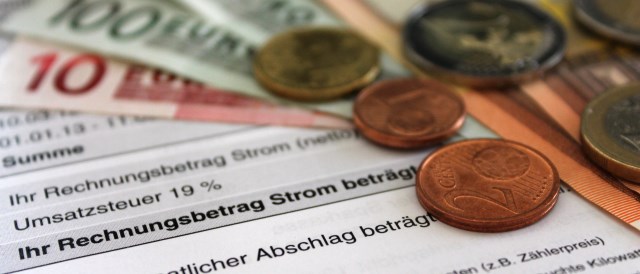In his series on how German energy policy needs to change, Craig Morris has focused on keeping costs down, but today he talks about spreading them around fairly. The issue is not just industry exemptions, but also grid costs in general.

A reform of the renewable energy sources act is due, especially to decrease the financial burden on consumers. (Uwe Schlick / pixelio.de)
In my last two posts on market failures, I talked about what needs to be changed for energy producers – both corporations and citizens/SMEs. Now, let’s talk about consumers.
First, there are industry exemptions, and in a way we don’t need to worry about these much – if a new German coalition does not act, Brussels will force it to. Wholesale power prices are going down in Germany, making the country’s industry power prices more competitive. Nonetheless, the number of firms largely exempt from the renewable surcharge (they pay less than one percent of the 5.3 cents per kilowatt-hour) has tripled over the past few years. It now includes firms that cannot possibly go abroad in search of lower power prices, such as brown coal excavator Vattenfall Mining and a few municipal tram line operators. Here, the solution is simple – make firms that cannot go abroad ineligible for the exemption.
The second industry exemption pertains to the grid fee itself and is technically unrelated to renewables policies. Nonetheless, it increases the rates for consumers who are not exempt when those fees are spread across a smaller number of ratepayers. There is no justification for this bizarre policy, which essentially states that those who need the grid more should pay nothing for it. It is a blatant subsidy for industry. Revoking of both of these exemptions would not lower the cost of the energy transition, but it would lower retail prices by spreading those costs across more ratepayers.
Grid fees are passed on to retail customers by the kilowatt-hour, which produces another problem – those producing their own electricity (either from a solar roof or, less often, from a small wind generator or cogeneration unit) pay less and less for the grid even though they still need it. The unintended result is that those who have not yet installed their own power generator at home cover more of the grid costs for those who have.
The solution here is similar to the capacity payments proposed for backup generators: pay for the service provided (here, reliability), not the amount that flows. Specifically, if you have a grid connection of a particular size, you could pay a monthly fee regardless of how much power you consume.
Critics of the idea speak of a double standard because energy efficiency has the same effect. They have a point, but there are differences. First, everyone can cut consumption but not everyone can invest in a solar roof or wind generator at home. Second, efficiency and conservation can actually reduce the amount of power generation capacity needed to meet peak demand on November evenings in Germany, which solar cannot.
But most of all, there is a conflict between my proposal of a monthly flat fee for grid connections and efficiency. You see, we pass on costs by the kilowatt-hour now to encourage efficiency by making each unit more expensive. Shift part of the charges – here, the grid fee – to a flat monthly rate, and your kilowatt-hour becomes slightly less expensive, making greater consumption cheaper.
One option here would be to charge less for the first tier of consumption and more above that level, so that investments in efficiency pay for themselves.
Unfortunately, all of this begins to look like government intervention on what is essentially a free market; German power firms can set rates however they like, and retail customers can pick and choose – and switch at the end of the month. Few of them choose to do so, however. Indeed, if German consumers did switch power providers as eagerly as they search for the cheapest gas stations, some of these problems would solve themselves.
Craig Morris (@PPchef) is the lead author of German Energy Transition. He directs Petite Planète and writes every workday for Renewables International.